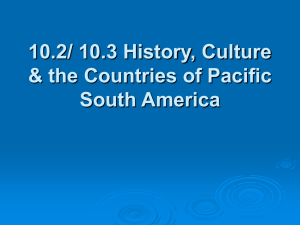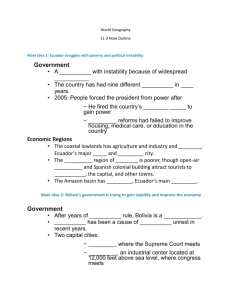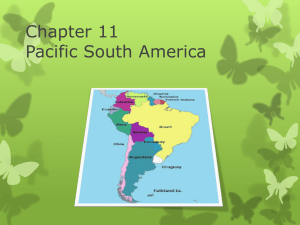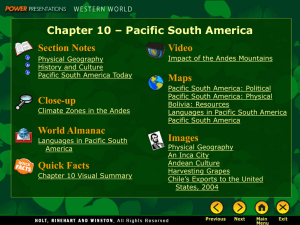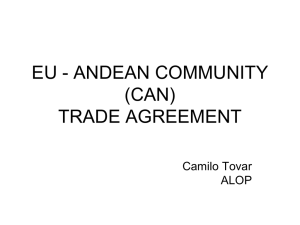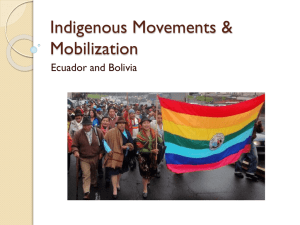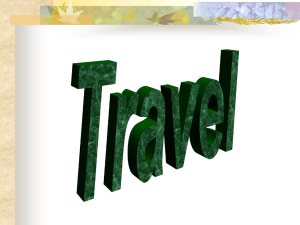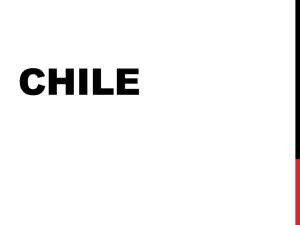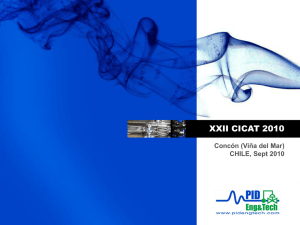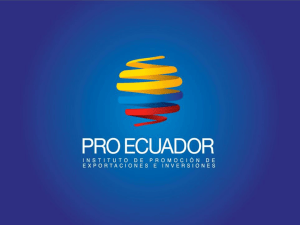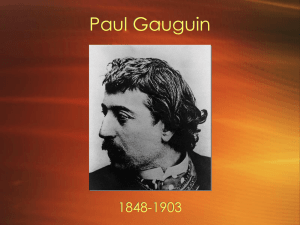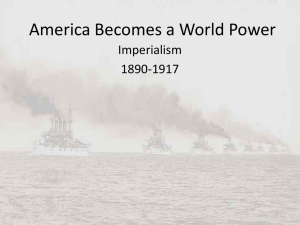Chapter 11
advertisement
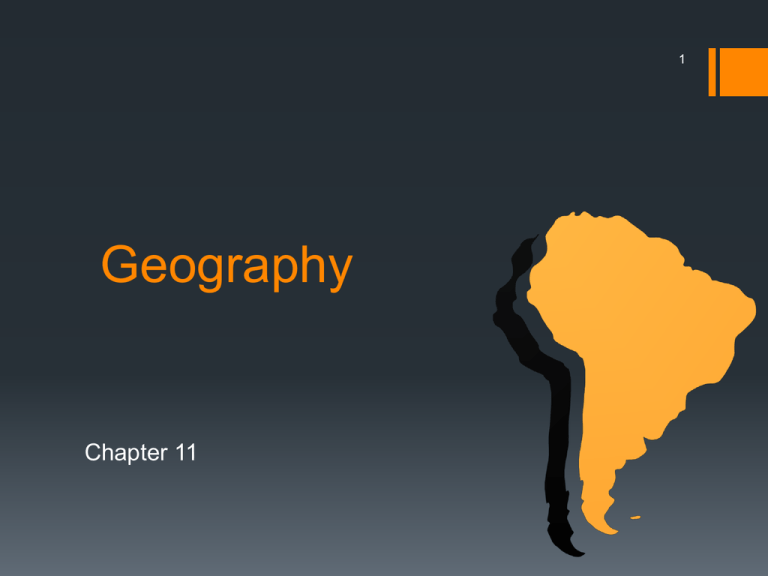
1 Geography Chapter 11 2 Section 1 3 Essential Questions What are the physical features of Pacific South America? What are the climates and natural resources of Pacific South America? 4 Vocabulary Altiplano- a broad high plateau called altiplano lies between the ridges. Strait- is a narrow body of water connecting two larger bodies of water El Nino- an ocean and weather pattern that affects the Pacific Coast Atacama Desert- this desert is about 600 miles long 5 Andes Mountains Runs through Ecuador, Peru, Bolivia, and Chile Ridges and volcanic peaks in the Andes rise more than 20,000 ft. above Sea level Plate tectonics formed the Andes mountains When an earthquake hits, it sends ice and mud rushing down the mountain slopes 6 Atacama Desert 600 miles long Rain falls less than 5 times per century Cloud cover keeps the air near the ground from being warmed by the sun Makes Chile the coldest and driest 7 Strait of Magellan Links the Atlantic Ocean and the Pacific Ocean 350 miles long 2-20 miles wide Cold and foggy climate 8 Climate and Vegetation Climate and Vegetation varies widely in Pacific South America Elevation caused climates to vary Coastal regions have desert climates El Nino causes the Pacific Ocean waters to warm 9 Natural Resources Forests in southern Chile and in eastern Peru and Ecuador provide lumber. Coastal Pacific waters are rich with fish Ecuador has large oil and gas reserves. Oil is the country’s main export Bolivia has some deposits of tin, gold, silver, lead, and zinc Chile has copper, Chile exports more copper than any other country 10 Assessment Questions 1a. What is the main physical feature of Pacific South America? The main physical feature is the Andes Mtns. 1b. How is Bolivia’s location unique in the region? Bolivia has many rivers, lakes, and mineral deposits. 2a. What is El Nino, and what are some of its effects? El Nino is an ocean and weather pattern that affects the Pacific coast. It causes ocean waters to warm. 11 Assessment Questions 2b. Why are some parts of Ecuador, in the tropics, cooler than parts of southern Chile? Ecuador has a higher elevation than Chile, and high elevations cause colder climates. 3a. What country in this region has large oil reserves? Ecuador. 3b. Why do you think much of the region is not good for farming? The region is mostly cool, arid lands that are bad for farming. 12 Assessment Questions 3c. What effects do you think copper mining in Chile might have on the environment? It is going to lower the elevation and create pits. 13 Section 2 14 Essential Questions What are the early cultures of South America? What did the Inca Empire build? 15 Vocabulary Viceroy- governor Creoles- American-born descendants of Europeans 16 Early Cultures Peru’s first advanced civilization reached its height in 900 BC They built stone terraces to farm on the steep mountainsides 17 The Inca Empire In the Early 1500s, the Inca people controlled an area that stretched from northern Ecuador to central Chile It was home to as many as 12 million people Irrigation turned deserts into rich farmland Stone-paved roads connected the empire Messages were carried by relay runners who could run as much as 150 miles per day. 18 Spanish Rule By 1535, the Spanish had conquered the Inca Empire The Spanish dealt with the natives harshly, forcing them to work in gold mines or on plantations A Viceroy, or governor, was appointed by the king of Spain to make sure the natives followed the Spanish laws 19 Independence In the early 1800s, people began to revolt against Spanish rule Creoles were the main leaders of the revolts. Chile, Ecuador, Peru, and Bolivia were independent by 1825 20 Culture Spanish and native cultures have left their marks on the region Most people in the area speak Spanish Most are Roman-Catholic Practice ancient religious customs 21 Assessment Questions 1a. What ancient empire built paved roads through the Andes? The Inca Empire 1b. What role did Creoles play in the history of Pacific South America? They were the main leaders of the revolts. 1c. How might the Inca empire have been different if they had wheels and horses? They could travel faster. 2a. What country has the highest percentage of South American Indians in its population? Peru. 22 Assessment Questions 2b. What aspects of culture in Pacific South America reflect Spanish influence, and what aspects reflects Indian Heritage? Spanish is the main language of all countries in the region, but most people speak they native language. 23 Section 3 24 Essential Questions What is Ecuador like today? What is Bolivia like today? What is Peru like today? What is Chile like today? 25 Vocabulary Quito- Ecuador’s capital La Paz- Bolivia’s capital city, highest capital in the world Lima- Capital of Peru Coup- sudden overthrow of a government Santiago- Capital of Chile 26 Ecuador Ecuador has been a democracy since 1979 In 2004, the president fired most supreme court judges because they did not support him In 2009, Rafael Correa was the first president to be reelected in more than 30 years 27 Bolivia Bolivia is a poor country Many years of military rule Now a democracy Capital is La Paz Highest capital city in the world(12,000 ft.) 28 Peru Largest country Capital is Lima 1980s and 1990s terrorism caused 70,000 deaths Peru’s resources cause the economy to progress 29 Chile Chile has a democratic government and growing economy In 1970, the president of Chile was overthrown in a U.S. backed coup 1980s new democratic government formed 2010 first female president elected 30 Assessment Questions 1a. What is Ecuador’s largest city? The largest city is Quito. 1b. Why have Ecuadorians been unhappy with their government in recent years? They’ve had many different presidents. 2a. What are Bolivia’s two capital cities? Sucre and La Paz. 2b. Why might Bolivia’s economy improve in the future? Foreign aid has provided funds for a developer. 31 Assessment Questions 3a. Why did many Peruvians move to Lima from the Highlands in the 1980’s? They moved due to industry, universities, and government jobs. 3b. What challenges do you think people who moved to Lima from the Highlands face? They have a hard time getting water and electricity. 4a. What is a coup? A coup is a sudden overthrow of a government. 4b. What might happen to Chile’s economy if the price of copper drops? Chile will become more poor. 32 Citations “Football in Ecuador and Other Sporting Activities.” Sports in Ecuador. N.p., n.d. Web. 29 Jan. 2014 “Ecuador.” News. N.p., 29 Jan. 2014. Web. 29 Jan. 2014. “Straight of Magellan(channel,South America).” Encyclopedia Britannica Online. Encyclopedia Brittanica, n.d. Web. 28 Jan. 2014. “Ecuador Official, National, and Public Holidays.” Ecuador Travel: Your Ecuadorian Guide for Things to Do, Hotels, Dining, Shopping, Events & More. N.p., n.d. Web. 28 Jan. 2014 33 Citations “The Observatory of Economic Complexity :: Ecuador Exports, Imports and Trade Partners.” The Observatory of Economic Complexity :: Ecuador Exports, Imports, and Trade Partners. N.p., n.d. Web. 29 Jan. 2014. “Economy of Peru.” Wikipedia. Wikimedia Foundation, 15 Jan. 2014. Web. 28 Jan. 2014 “Peru This Week.” Peru This Week. N,p., 28 Jan. 2014. Web. 26 Jan. 2014 “Maps of World.” Maps of World: South America. N.p., 18 Jan. 2013. Web. 26 Jan. 2014
